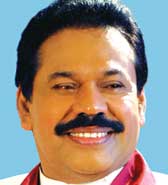President Mahinda Rajapaksa has said the Sri Lankan media can and do chastise him and the government for the high cost of living, high prices of food and fuel and other issues and he could understand that.
His plea to the media, however, is not to publish information and material that could be beneficial to the LTTE thus undermining his government’s efforts to weaken militarily those who are trying to divide the country, engage in terrorism and kill civilians.
 |
| President Mahinda Rajapaksa |
President Rajapaksa was speaking exclusively to the Sunday Times in an hour-long discussion that ranged across several issues some of which cannot be published.
His remarks on the media followed questions by The Sunday Times on the reported threats to the media and the intimidation of journalists, the most recent being the attack on Keith Noyahr, the associate editor of The Nation newspaper.
Mr. Rajapaksa said that a plethora of defence columns and military-related commentaries appearing in the local media were carefully scrutinised by the LTTE.
He said the government was aware that information and references to intended military movements, defence capabilities, defensive measures adopted by the government, weapons purchases and other data were extrapolated by LTTE analysts and used to form a composite picture of the military’s strengths and weaknesses and to anticipate action.
He said this was unacceptable, for it was tantamount to providing the enemy with vital information.
“The other day I called media owners and senior editors for a meeting and I pointed out this problem. I said that such information is a blow to the country at a time when we are trying to weaken the LTTE militarily.”
The widely reported intimidation of the media was one of the themes taken up by the Amnesty International-led protestors opposite Marlborough House where the Commonwealth’s mini-summit was held on Tuesday. That protest on Monday drew just a handful of demonstrators unlike the pro and anti-Sri Lanka protests on Tuesday which attracted several hundreds from the Sri Lankan diaspora who again gathered opposite Marlborough House and streets nearby.President Rajapaksa conceded that the anti-government diaspora and NGOs were conducting a vigorous campaign against Sri Lanka and feeding foreign politicians and watchdog institutions with a distorted picture.
He said he was able this time to tell some of the Commonwealth leaders who attended the mini summit, British ministers and other politicians of the steps being taken to bring democracy to parts of the country that had not enjoyed it for several years.“I pointed out that we are not trying to bring a military solution to our conflict. It is because we want those who are living under LTTE terrorism also to enjoy democratic governance that we are trying to weaken the LTTE militarily and find a political end to the conflict.”
If the LTTE continues to commit acts of terror, if they will not come to the negotiating table to talk peace and find a political solution what can the government do but try to drag them into negotiations, the President had asked the leaders. He said they understood his position.
“I told them that a one-time LTTE terrorist leader was recently elected to political office because we allowed him to enter the democratic process. He is not just an elected provincial member. He is the chief minister of that province. How many other countries have been able to achieve this in such a short time, holding elections and bringing militants in the political mainstream?”
President Rajapaksa said Sri Lanka must strengthen its own efforts to articulate its case cogently to counter the pro-LTTE lobbies and NGOs that were painting Sri Lanka in the darkest colours.
| 
